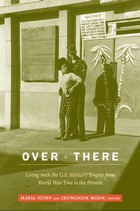2 books about Military bases, American

Over There
Living with the U.S. Military Empire from World War Two to the Present
Maria Höhn and Seungsook Moon, eds.
Duke University Press, 2010
Over There explores the social impact of America’s global network of more than 700 military bases. It does so by examining interactions between U.S. soldiers and members of host communities in the three locations—South Korea, Japan and Okinawa, and West Germany—where more than-two thirds of American overseas bases and troops have been concentrated for the past six decades. The essays in this collection highlight the role of cultural and racial assumptions in the maintenance of the American military base system, and the ways that civil-military relations play out locally. Describing how political, spatial, and social arrangements shape relations between American garrisons and surrounding communities, they emphasize such factors as whether military bases are located in democratic nations or in authoritarian countries where cooperation with dictatorial regimes fuels resentment; whether bases are integrated into neighboring communities or isolated and surrounded by “camp towns” wholly dependent on their business; and whether the United States sends single soldiers without families on one-year tours of duty or soldiers who bring their families and serve longer tours. Analyzing the implications of these and other situations, the contributors address U.S. military–regulated relations between GIs and local women; the roles of American women, including military wives, abroad; local resistance to the U.S. military presence; and racism, sexism, and homophobia within the U.S. military. Over There is an essential examination of the American military as a global and transnational phenomenon.
Contributors
Donna Alvah
Chris Ames
Jeff Bennett
Maria Höhn
Seungsook Moon
Christopher Nelson
Robin Riley
Michiko Takeuchi
[more]

Settler Garrison
Debt Imperialism, Militarism, and Transpacific Imaginaries
Jodi Kim
Duke University Press, 2022
In Settler Garrison Jodi Kim theorizes how the United States extends its sovereignty across Asia and the Pacific in the post-World War II era through a militarist settler imperialism that is leveraged on debt as a manifold economic and cultural relation undergirded by asymmetries of power. Kim demonstrates that despite being the largest debtor nation in the world, the United States positions itself as an imperial creditor that imposes financial and affective indebtedness alongside a disciplinary payback temporality even as it evades repayment of its own debts. This debt imperialism is violently reproduced in juridically ambiguous spaces Kim calls the “settler garrison”: a colonial archipelago of distinct yet linked military camptowns, bases, POW camps, and unincorporated territories situated across the Pacific from South Korea to Okinawa to Guam. Kim reveals this process through an analysis of how a wide array of transpacific cultural productions creates antimilitarist and decolonial imaginaries that diagnose US militarist settler imperialism while envisioning alternatives to it.
[more]
READERS
Browse our collection.
PUBLISHERS
See BiblioVault's publisher services.
STUDENT SERVICES
Files for college accessibility offices.
UChicago Accessibility Resources
home | accessibility | search | about | contact us
BiblioVault ® 2001 - 2024
The University of Chicago Press









